Team Members (M-Z)
Team Members (M-Z)
Emeran A. Mayer, MD - Digestive Diseases
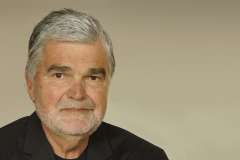
Founding Director, Goodman-Luskin Microbiome Center
Director, G. Oppenheimer Center for Neurobiology of Stress and Resilience
Professor of Medicine, Physiology and Psychiatry
Vatche and Tamar Manoukian Division of Digestive Diseases
David Geffen School of Medicine at UCLA
Dr. Mayer received his MD degree from the Ludwig Maximilian’s University in Munich, Germany, in 1976, completed his residency at the Vancouver General Hospital in Vancouver, Canada, and his GI fellowship training at the UCLA/VA Wadsworth Training Program. Dr. Mayer has a career long interest in clinical and research aspects of brain body interactions, with a longstanding focus on the bidirectional communication between the brain and the gut in health and disease. He is recognized as one of the leading investigators in the world of brain gut microbiome interactions in gastrointestinal disorders, including chronic visceral pain, functional and inflammatory bowel disorders, ingestive behavior and obesity. He has been continuously funded by the National Institutes of Health since 1989.
He has been PI of a NIH Center grant on sex differences in functional GI disorders for the past 18 years, and PI on a NIDDK funded U01 consortium grant of brain bladder interactions for 18 years, co-PI on a grant by the Department of Defense on brain-gut-microbiome interactions in autism spectrum disorders, co-PI on a Crohn’s and Colitis Foundation grant on brain-gut-microbiome signatures of stress-related IBD symptom flares, and co-PI on a NIH U19 consortium grant and a RO1 grant on brain gut microbiome interactions in Alzheimer’s disease.
He has published 415 peer-reviewed articles in the leading GI and neuroscience journals, including 100 reviews and book chapters and has co-edited three scientific books. His articles have been cited 61,566 times and his h-factor is 125. He has published two books for the general public on brain gut microbiome interactions (the bestselling The Mind Gut Connection, and more recently The Gut Immune Connection) which have been translated into 14 languages. A third book, Interconnected Plates, will be published in Fall 2023.
Dr. Mayer has received numerous awards, including the Distinguished Mentor Award from the American Gastroenterological Association and the Ismar Boas Medal of the German Gastroenterological Association. He has been a regular member of the NIDDK CIMG study section from 2010-2015, has been president of the Functional Brain Gut Group, and associate editor of Gastroenterology. G. Oppenheimer Center for Neurobiology of Stress and Resilience
Jeff F. Miller, PhD - Microbiology, Immunology & Molecular Genetics
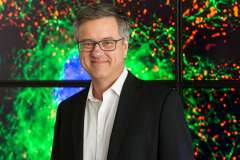
Fred Kavli Chair in NanoSystems Sciences
Director of the California NanoSystems Institute
Professor of Microbiology, Immunology and Molecular Genetics
David Geffen School of Medicine at UCLA
Dr. Miller’s laboratory focuses on molecular mechanisms of bacterial pathogenesis, the evolution of functional diversity in bacteria and phage, and bio-inspired engineering of precision antibiotics. Dr. Miller received his bachelor’s degree in Chemistry from Case Western Reserve University and his PhD in Molecular Biology from Tufts University School of Medicine. After postdoctoral training with Dr. Stanley Falkow at Stanford, he joined the faculty at UCLA in 1990. From 2002-2014 he held the M. Philip Davis Chair in Microbiology and Immunology and served as Chair of the Department of Microbiology, Immunology and Molecular Genetics. In November, 2014, he was appointed Director of the California NanoSystems Institute at UCLA. In 2004, Dr. Miller co-founded AvidBiotics Corp., a biotherapeutics company in South San Francisco. In 2017 AvidBiotics split to form Pylum Biosciences, a precision antibiotics company, and Xyphos Inc., an immuno-oncology company that was acquired by Astellas Pharma in December, 2019. In 2009 Dr. Miller was appointed by the Secretary of Health and Human Services to serve on the National Science Advisory Board for Biosecurity. From 2012-2014 he served two consecutive terms as President of the American Society for Microbiology, which represents over 40,000 members in the US and abroad. Dr. Miller is a former Pew Scholar in the Biomedical Sciences, a member of the American Academy of Microbiology, a fellow of the American Association for the Advancement of Science, and in 2015 he was elected to membership in the U.S. National Academy of Sciences. Jeffrey H. Miller Lab
Million Mulugeta, DVM, PhD, AGAF - Digestive Diseases
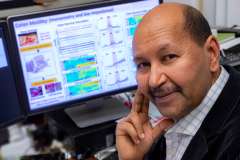
Director, Models of Gastrointestinal Function and Disease (MGFD) Core
Adjunct Professor of Medicine
Vatche and Tamar Manoukian Division of Digestive Diseases
David Geffen School of Medicine at UCLA
Dr. Mulugeta leads research on “pre-clinical neurogastroenterology and motility/translational research.” Specific interest is the gut-brain-gut connection through the study of functional and structural circuitry of the autonomic nervous system to pelvic organs (colon and bladder) and neuromodulation of the autonomic nervous system in health and disease of pelvic organs. These works involve multi-center experts and international teams. Dr. Mulugeta also leads research on the development and use of novel “multi-modality smart pill” and neuromodulation devices and approaches to assess/treat gut secretomotor functions in health and diseases. In addition, he studies the specific role of CRF2 receptors (CRF2R) in stress-related alteration of colonic function and visceral pain. The project tests the hypothesis that CRFR2 activation modulates stress-related neuroenteric physiology and visceral pain of colonic origin. Dr Mulugeta’s works are supported through National Institutes of Health (NIH), National Science Foundation (NSF) and industry grants. Dr. Mulugeta teaches ‘Modern Concepts in Physiology” at Integrative Biology & Physiology at UCLA.
Dr. Mulugeta has published several papers on the brain-gut interaction and stress related gastrointestinal motility, pain and inflammatory responses. He is a reviewer for numerous medical journals and serves as editorial board member for the American Journal of Physiology. Dr. Mulugeta serves as a member to several special emphasis panels of NIH to review grant applications. He is recipient of several awards including the 2011 International Foundation for Functional Gastrointestinal Disorders award in basic sciences. Mulugeta Lab
Bruce Naliboff, PhD - Digestive Diseases
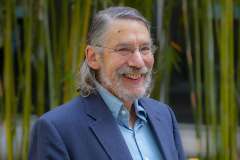
Project Scientist
Director, Pain Research Program, G. Oppenheimer Center for Neurobiology of Stress and Resilience
Vatche and Tamar Manoukian Division of Digestive Diseases
David Geffen School of Medicine at UCLA
Career Scientist, VA-GLA (ret.)
Dr. Naliboff is a project scientist in the Department of Medicine at the David Geffen School of Medicine at UCLA and director of the Pain Research Program of the G. Oppenheimer Center for Neurobiology of Stress and Resilience and is a co-director of the Clinical Studies and Database Core for the UCLA Goodman-Luskin Microbiome Center. Naliboff received his PhD in clinical psychology from Bowling Green State University in Ohio and interned at the UCLA Neuropsychiatric Institute. During his long tenure at UCLA and the VA, he has served as senior psychologist in the UCLA and VA Pain Management Programs as well as a VA career scientist. Dr. Naliboff's research has focused on psychosocial and brain mechanisms of stress and chronic pain with an emphasis on chronic visceral pain disorders such as irritable bowel syndrome (IBS). He has led critical studies into the perceptual and cognitive aspects of chronic pain states including the role of negative and positive emotions in modulating pain symptoms and impact. He is also a leader in the development and evaluation of non-pharmacological therapies for both visceral and somatic pain and studied the clinical use of opioid medications. Dr. Naliboff has over 250 scientific publications on these topics, has had continuous funding from the NIH and VA, and he has served as a consulting editor for numerous scientific publications in psychology and medicine and on national and international committees as a grant reviewer and program consultant. G. Oppenheimer Center for Neurobiology of Stress and Resilience
Aydogan Ozcan, PhD - Electrical & Computer Engineering; Bioengineering
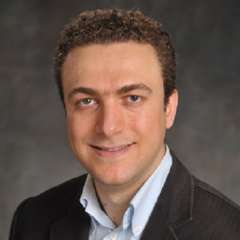
Chancellor's Professor at UCLA
Volgenau Chair for Engineering Innovation
Electrical & Computer Engineering, Bioengineering
UCLA Samueli School of Engineering
HHMI Professor, Howard Hughes Medical Institute
Associate Director, California NanoSystems Institute (CNSI)
Dr. Ozcan is elected Fellow of the National Academy of Inventors (NAI) and holds >65 issued/granted patents in microscopy, holography, computational imaging, sensing, mobile diagnostics, nonlinear optics and fiber-optics, and is also the author of one book and the co-author of >1000 peer-reviewed publications in leading scientific journals/conferences. He has received major awards, including the Presidential Early Career Award for Scientists and Engineers (PECASE), International Commission for Optics ICO Prize, Dennis Gabor Award (SPIE), Joseph Fraunhofer Award & Robert M. Burley Prize (Optica), SPIE Biophotonics Technology Innovator Award, Rahmi Koc Science Medal, SPIE Early Career Achievement Award, Army Young Investigator Award, NSF CAREER Award, NIH Director’s New Innovator Award, Navy Young Investigator Award, IEEE Photonics Society Young Investigator Award and Distinguished Lecturer Award, National Geographic Emerging Explorer Award, National Academy of Engineering The Grainger Foundation Frontiers of Engineering Award and MIT’s TR35 Award for his seminal contributions to computational imaging, sensing and diagnostics. Dr. Ozcan is elected Fellow of Optica, AAAS, SPIE, IEEE, AIMBE, RSC, APS and the Guggenheim Foundation, and is a Lifetime Fellow Member of Optica, NAI, AAAS, SPIE and APS. Dr. Ozcan is also listed as a Highly Cited Researcher by Web of Science, Clarivate. Ozcan Research Institute
Paivi E. Pajukanta, MD, PhD - Human Genetics

Professor of Human Genetics
Diller-von Furstenberg Family Endowed Chair in Precision Clinical Genomics
Vice Chair, Department of Human Genetics
Director, Cardiometabolic Genomics, Institute for Precision Health
Director, Genetics and Genomics PhD Program
David Geffen School of Medicine at UCLA
Dr. Pajukanta's research group is identifying biological mechanisms of DNA variants and genes involved in complex cardiovascular and metabolic disorders using integrative genomics approaches. Her research aims to discover gene-environment interactions and context-specific transcriptional and epigenomic effects contributing to cardiometabolic disorders in Mexicans and Europeans by integrating transcriptomics, epigenomics, and genomics data with deep clinical and histology-based phenotype and electronic medical record data. Dr. Pajukanta is especially interested in single cell RNA-sequencing studies of metabolic tissues to decompose cell-type proportions and cell-type specific expression of genes and their connections to cardiometabolic traits; as well as in genomic studies of the admixed Mexican population that has been underrepresented in genomic studies despite their high predisposition to obesity, type 2 diabetes, dyslipidemias, fatty liver disease, and other cardiometabolic disorders. Dr. Pajukanta has served as a principal investigator in several NIH R01 grants and as a project leader of an NIH PPG grant. She has trained multiple undergraduate, graduate, and postdoctoral students; taught graduate level courses; and served as a problem-based learning tutor of medical students. She is also the director of the genetics and genomics home area of graduate education at UCLA; the vice chair in the Department of Human Genetics at UCLA; and the director of cardiometabolic genomics at the Institute for Precision Health at UCLA. Dr. Pajukanta Profile
Junyoung O. Park, PhD - Chemical & Biomolecular Engineering
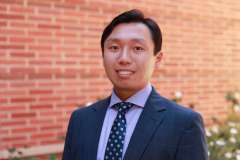
Assistant Professor, Chemical and Biomolecular Engineering
Co-Director, UCLA Metabolomics Center
Henry Samueli School of Engineering and Applied Sciences at UCLA
Dr. Park's research group engineers metabolism for sustainable bioproduct synthesis and quantifies metabolic flux control in microbial, cancer, and immune cells for therapeutic discovery by employing liquid chromatography-mass spectrometry (LC-MS), isotope tracing, and mathematical modeling. His recent awards include NIH Maximizing Investigators’ Research Award (MIRA) and Hellman Fellowship. Park Lab
Joseph Pisegna, MD - Gastroenterology, Hepatology & Parenteral Nutrition

Chief, Division of Gastroenterology, Hepatology and Parenteral Nutrition
Veterans Administration Greater Los Angeles Healthcare System, Wadsworth VA
Professor-In-Residence of Medicine and Human Genetics
David Geffen School of Medicine at UCLA
Dr. Pisegna’s main research interest is the molecular pharmacology of hormones and receptors in the gastrointestinal tract. These research and clinical interests derive from research in the biochemistry and molecular physiology of neuroendocrine tumors as well as an understanding of the molecular interaction of peptide hormones and their receptors. His clinical efforts are currently focused on the management of gastric hypersecretory conditions, neuroendocrine tumors of the GI tract, and Zollinger Ellison Syndrome (ZES), medical conditions that derive from alterations in the expression of gastrointestinal hormones. Dr. Pisegna cloned the receptor for human cholecystokinin A (CCKA), the cholecystokinin B (CCKB or gastrin) receptor and the pituitary adenylate cyclase activating polypeptide (PACAP) receptor. He has previously demonstrated that PACAP is a potent stimulant of gastric acid secretion and is expressed on neurons innervating the stomach, on enterochromaffin-like cells (ECL) of the stomach expressing receptors for PACAP. Using mice lacking the PAC1 receptor, he has demonstrated that the mice develop a gastric acid hypersecretory condition resulting from hypergastrinemia. Recently his lab is focused on understanding the role of peptide hormones in the development of obesity, metabolic syndrome and NAFLD. Dr. Pisegna's research interests extend to understanding the molecular mechanisms involved in satiety and metabolic syndrome including the role of the gastrointestinal microbiome.
Srinivasa T. Reddy, PhD - Molecular & Medical Pharmacology; Cardiology

Professor In-Residence
Department of Molecular & Medical Pharmacology; Department of Cardiology
University of California, Los Angeles
Dr. Reddy is interested in understanding the expression, regulation, and mechanism of action, of enzymes involved in lipid and lipoprotein metabolism, and their role in the development of inflammatory diseases with focus on discovering diagnostic and therapeutic molecules for their treatment. His laboratory is conducting pioneering research on PON proteins. Dr. Reddy received his PhD in comparative biochemistry from the University of California, Berkeley, and completed his postdoctoral fellowship in cell and molecular biology from University of California, Los Angeles. Dr. Reddy Profile
Beate Ritz, MD, PhD - Epidemiology; Environmental Health Sciences; Neurology
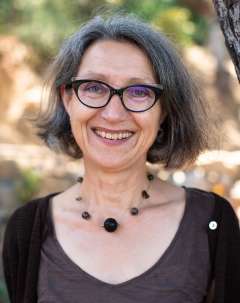
Dr. Ritz is a distinguished professor of epidemiology at the UCLA Fielding School of Public Health with co-appointments in environmental health sciences and neurology at the UCLA, School of Medicine; and a member of the Center for Occupational and Environmental Health. She initiated the field of air pollution and pregnancy outcome research in the mid-1990s. Her lab has studied the effects of occupational and environmental toxins focusing on air pollution and pesticides, developing geographic information system (GIS) based exposure assessment tools and also applying omics approaches to discover biological signatures for environmental factors impacting pregnancy and reproductive outcomes (gestational disorders, adverse birth outcomes, placenta function), neurodevelopment (autism, cerebral palsy, ADHD), and neurodegeneration (Parkinson’s and Alzheimer disease). Dr. Ritz served on multiple National Academy of Sciences Institute of Medicine (NAS-IOM) committees, U.S. EPA panels, and the Scientific Advisory Board for the California State Air Toxics Assessment Program. She has served as president of the International Society for Environmental Epidemiology (ISEE in 2018-19). In 2007, she received the Robert M. Zweig M.D. Memorial Award (Clean Air Award), and in 2022, the Society for Epidemiology Research (SER) Ken Rothman Career Achievement Award for scientific innovation in research or teaching of epidemiology. In 2024, she received the John Goldsmith Award for sustained and outstanding contributions to the knowledge and practice of environmental epidemiology from the ISEE. Ritz Lab
Karen Reue, PhD - Human Genetics

Professor and Vice Chair, Human Genetics
Associate Director, UCLA/Caltech Medical Scientist Training Program
David Geffen School of Medicine at UCLA
The Reue laboratory is interested in the identification of genes, pathways, and the role of sex in the development of traits underlying the Metabolic Syndrome, including obesity, dyslipidemia, and insulin resistance. Using genetic manipulation in mouse models, our findings have revealed independent roles for gonadal hormones and genetic sex (XX vs. XY chromosomes) in dietary lipid absorption, regulation of circulating lipid levels, development of adipose tissue, mitochondrial function, and statin-related diabetes. Laboratory of Karen Reue
Rachel Sarnoff, MD, MSCR - General Internal Medicine; Digestive Diseases
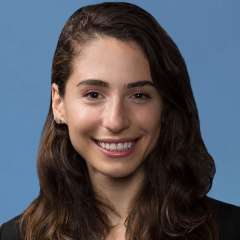
Health Sciences Assistant Professor of Medicine
DGBI – Internal Medicine Specialist
Internal Medicine – Primary Care Provider
Division of General Internal Medicine
Vatche and Tamar Manoukian Division of Digestive Diseases
David Geffen School of Medicine at UCLA
Dr. Sarnoff graduated with honors from Brown University with a concentration in human health and biology. Between college and medical school, she returned to New York to work in Dr. Jeffrey Friedman’s molecular genetics lab at Rockefeller University, where she investigated genetic enhancer proteins for leptin hormone. She completed medical school at NYU Langone School of Medicine, where she was inducted into the Gold Humanism Honor Society as a student role model for compassionate and empathetic medical care. At NYU, she worked under the mentorship of Dr. Martin Blaser, investigating connections between the gut microbiome and precancerous colon polyps that was featured on CBS News.
Dr. Sarnoff completed her internal medicine residency and chief residency at UCLA, where her passion for teaching, communication, and innovation in medical education and patient care led her to receive multiple teaching and young investigator awards. Primed by her microbiome work and ignited by the complex patients she saw during her residency, her interest in the gut environment expanded to disorders of gut-brain interaction (DGBI). She worked in Dr. Arpana Church’s lab to explore brain-gut-microbiome signatures in irritable bowel syndrome subtypes, first-authoring a manuscript that was recently published in Neuropharmacology.
After chief year, Dr. Sarnoff partnered with her closest mentor, Dr. Lin Chang, to create a physician-scientist training program for herself with the goal of developing a DGBI niche within internal medicine. To learn how to design and critique clinical trials in the DGBI space, she completed a master of science in clinical research, for which she was awarded departmental funds. She was also Career Enhancement Core scholar within the Chang-Mayer SCORE NIH grant, where she designed her own study on sex differences IBS cellular immune response, as well as recruiting for clinical trials. Her research is also supported in part by the Goodman-Luskin Microbiome Center. Clinically, she trained for one year under DGBI specialists such as Dr. Chang as well as the Integrative GI interdisciplinary care team and then launched the inaugural DGBI-Internal Medicine Clinic at UCLA in the summer of 2024. She also practices as a primary care provider at internal medicine suites, where she trains residents and medical students. She is most interested in studying the effect of interdisciplinary care on DGBI, as well as identifying factors that influence risk of developing DGBI, such as sex differences, early life adversity, psychological comorbidity, and microbiome changes.
Dr. Sarnoff is board certified in internal medicine. She is dual appointed by the Divisions of General Internal Medicine and Digestive Diseases.
Jenny Sauk, MD - Digestive Diseases

Director, Clinical Care, UCLA Center for Inflammatory Bowel Diseases
Health Sciences Associate Clinical Professor of Medicine
Vatche and Tamar Manoukian Division of Digestive Disease
David Geffen School of Medicine at UCLA
Dr. Sauk received her undergraduate degree from Yale University and earned her medical degree from University of Chicago Pritzker School of Medicine. She subsequently completed her internal medicine residency at New York Presbyterian Hospital Weill-Cornell Medical Center and her gastroenterology fellowship at Mount Sinai School of Medicine in New York. After completing her gastroenterology fellowship, she joined Mount Sinai’s faculty as the Gerald and Ruth Crohn Dickler Faculty Scholar in Inflammatory Bowel Diseases. Dr. Sauk subsequently joined the faculty at Massachusetts General Hospital (MGH) and developed a specialized practice in IBD at the MGH Crohn’s and Colitis Center. Her clinical interest remains in the inflammatory bowel diseases, specifically ulcerative colitis, and Crohn’s disease. Dr. Sauk’s research interests have centered on clinical outcomes in inflammatory bowel disease. She is board certified in gastroenterology. Center for Inflammatory Bowel Diseases
Ricky R. Savjani, MD, PhD - Radiation Oncology
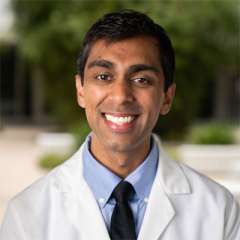
Assistant Professor of Medicine
Department of Radiation Oncology
University of California, Los Angeles
Dr. Savjani holds two bachelor of science degrees in brain and cognitive sciences and electrical engineering/computer science from MIT. He earned his MD and PhD at Texas A&M College of Medicine, where his thesis focused on mapping the functional organization of the human brain using functional MRI. Following a transitional year at the University of Chicago (NorthShore), Dr. Savjani completed his residency in radiation oncology at UCLA. During residency, he also pursued an ASTRO-sponsored fellowship at Varian, a Siemens Healthineers company, and completed the American Board of Radiology Holman Research Pathway.
Dr. Savjani specializes in radiation therapy for cancers of the brain, spine, and head and neck. He leads a multidisciplinary lab dedicated to advancing innovations in informatics, imaging-based AI, and technology applications. His research has received generous support from national agencies and industry partners, including the National Institutes of Health, the American Society of Radiation Oncology, the Radiological Society of North America, Varian, Siemens, NVIDIA, Google, Amazon, StratPharma, and multiple foundations. By integrating cutting-edge research and innovation, Dr. Savjani is committed to delivering state-of-the-art care to his patients. Dr. Savjani Provider Profile
Andrea S. Shin, MD, MSCR - Digestive Diseases
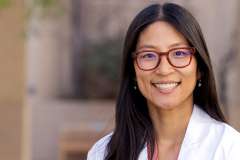
Director, Goodman-Luskin Microbiome Center Biorepository Core
Co-Director, Goodman-Luskin Microbiome Center Clinical Studies and Database Core
Director of Education, Walter and Shirley Wang Center for Integrative Digestive Health
Health Sciences Associate Clinical Professor of Medicine
Vatche and Tamar Manoukian Division of Digestive Diseases
David Geffen School of Medicine at UCLA
Dr. Shin specializes in the care of patients with disorders of gut-brain interactions (DGBI) and gastrointestinal motility disorders. She is committed to providing individualized care that emphasizes the multidimensional nature of DGBI and motility disorders. Her research interests relate to her clinical expertise and focuses on developing novel diagnostic and therapeutic approaches to treating disorders such as irritable bowel syndrome, functional diarrhea, chronic diarrhea, chronic constipation, and other DGBI. She received a K23 career development award through the National Institutes of Health, has co-authored over 80 peer-reviewed publications, and is a member of the Rome V Bowel Disorders Committee, the AGA Research Awards Panel and Research Institute Policy Committee, and the American Neurogastroenterology and Motility Society (ANMS) Council. She serves as chair of the ANMS Research Council, associate clinical editor for Neurogastroenterology & Motility, and as an editorial board member for Alimentary, Pharmacology & Therapeutics, Clinical Gastroenterology and Hepatology, and BMC Medicine. Shin Lab
Catia Sternini, MD - Digestive Diseases

Associate Director, UCLA: Digestive Diseases Research Center
Director, UCLA Imaging and Stem Cell Biology Core
Director, UCLA Pilot and Feasibility Study Program
Professor-in-Residence, Departments of Medicine and Neurobiology
Vatche and Tamar Manoukian Division of Digestive Diseases
David Geffen School of Medicine at UCLA
Dr. Sternini's research program is focused on two major areas: 1) the neuronal circuits that form the enteric nervous system or “brain in the gut,” which regulate intestinal functions, and 2) chemosensing in the gastrointestinal tract in conditions of gut microbial imbalance and obesity. Studies on the enteric nervous system are focused on the identification of enteric neuronal circuits and their targets in health and disease states and on the mechanisms that govern receptor-mediated responses with an emphasis on the µ opioid receptors, the primary targets of opioids clinically used for pain control. Chronic use of opioids induces opioid bowel dysfunction, a debilitating condition characterized by severe constipation and abdominal pain, the treatment of which remains a major challenge. The discovery that opioids differ in their efficiency to induce receptor internalization, a key regulatory process of receptor function, in enteric neurons and that receptor trafficking and signaling pathways differ in distinct neuronal cell populations, sheds light on the mechanisms of action of opioids on enteric neurons compared to the brain, which is essential for the development of effective analgesics devoid of gastrointestinal side effects. Additional studies are focused on changes in the expression of transmitters and receptors in different pathological conditions such as intestinal ischemia, enteric neuropathies, and chronic constipation. Studies on gut chemosensing are focused on the expression and regulation of taste receptors in the gastrointestinal tract in diet-induced obesity based on the finding that bitter taste receptors, the first point of contact with foodstuff in the oral cavity that can impact on food consumption, are expressed in enteroendocrine cells in the intestine, and are upregulated in a microbiota-and diet-dependent manner. These studies are testing the innovative hypothesis that bitter taste receptors detect luminal content including bacteria and bacteria products to induce functional responses through the release of signaling molecules by enteroendocrine cells, which modulate intestinal homeostasis, caloric intake, and metabolism. Taste receptors in the gut might represent a functional link between microbiota and host leading to modulation of gut function, appetite and satiety through the brain-gut-microbiome axis and might be a potential target for obesity prevention and treatment. Sternini Lab
Yvette Taché, PhD - Digestive Diseases

Distinguished Research Professor of Medicine
Vatche and Tamar Manoukian Division of Digestive Diseases
David Geffen School of Medicine at UCLA
VA Greater Los Angeles Healthcare System
Dr. Taché is a recognized leading expert in brain-gut interactions and the role of peptides in the underlying mechanisms of stress-related gut dysfunction and central vagal regulation of gut function. She and her research team reported some of the pioneer work on the central actions of peptides to influence digestive function and feeding behavior. Her laboratory provided the preclinical groundwork showing potential benefit of blocking corticotropin releasing signaling pathways in experimental models of irritable bowel syndrome and postoperative ileus. Building on her initial work on the peptidergic regulation of vagal activity to the gut, she is investigating with Dr. Pu-Qing Yuan their role in the modulation of the cholinergic anti-inflammatory reflex in the context of post-operative ileus. In collaboration with Dr. Lixin Wang, they demonstrated the role of ghrelin agonists to alleviate gut motor dysfunction in models of Parkinson’s disease. She is directing a consortium NIH SPARC grant on the structural and functional mapping of mammalian colonic nervous system.
Dr. Taché joined the Division of Digestive Diseases in 1982 and was appointed professor-in-residence in 1987 and distinguished professor since 2009. Professor Taché developed this field of research through continued competitive grants obtained from the National Institute of Health (NIH) since 1982 as well as Veteran Administration (VA) Merit Award since 2000 up to 2022. She was director of the Animal Core within the NIHDDK Digestive Diseases Center up to 2020 and a co-director of the UCLA G. Oppenheimer Center for Neurobiology of Stress and Resilience (CNSR). She published 392 peer-reviewed articles, 180 reviews, 23 editorials and edited 15 books. Professor Taché has been the recipient of NIHDDK MERIT Award, the Distinguished Research Award in Gastrointestinal Physiology from the American Physiological Society, the Janssen Award for Basic Research in Gastrointestinal Motility, the Senior Investigator–Basic Science Award from the International Foundation for Functional Gastrointestinal Disorders, the Research Scientist Award from the Functional Brain-Gut Research Group, the Outstanding American Gastroenterology Association (AGA) Women in Sciences, the Research Mentor Award from the AGA Institute Council, Distinguished Scientist Award for Women in Neurogastroenterology from the American Neurogastroenterology & Motility Society, and the Senior Research Career Scientist Award and Middleton Award from the Veteran Administration and the Legion of Honor from the French Government. She served on NIH and VA grant application review panels and editorial boards of many peptides, integrative physiology, gastroenterology, and stress-related journals and was an associated editor of Plos One. Taché Lab
Kirsten Tillisch, MD - Digestive Diseases

Chief of Integrative Medicine, Greater Los Angeles VA
G. Oppenheimer Center for Neurobiology of Stress and Resilience
Health Sciences Professor of Medicine
Vatche and Tamar Manoukian Division of Digestive Diseases
David Geffen School of Medicine at UCLA
Dr. Tillisch completed her undergraduate work at the Otis Institute of Parsons School of Design, earning a bachelor of fine arts with honors. She obtained her medical degree from the David Geffen School of Medicine at UCLA and was elected to the medical honor society Alpha Omega Alpha. She continued on at UCLA to complete her training in internal medicine and gastroenterology, graduating in 2003. Dr. Tillisch is the gastroenterology leader for the Scientific Foundations of Medicine Course for first year medical students at the David Geffen School of Medicine. She is an advocate for the incorporation of integrative practices within the medical system to advance health. She is a medical acupuncturist and is trained in medical hypnotherapy by the American Society of Clinical Hypnosis. She has a clinical interest in chronic pain and functional gastrointestinal disorders, and was a member of the Rome IV Committee for Central Disorders of Gastrointestinal Pain. Her research interests include brain-gut-microbiome interactions, the effects of complementary and alternative medicine interventions such as meditation, probiotics, acupuncture, hypnotherapy, and herbal therapy on health and disease, and treatment of functional gastrointestinal disorders. In addition to her role at UCLA, Dr. Tillisch is the chief of Integrative Medicine at the Greater Los Angeles VA, managing programs in Tai chi, yoga, acupuncture and integrative health.
Antonio Tinoco Valencia, PhD - Chemistry and Biochemistry

Assistant Professor of Chemistry and Biochemistry
Department of Chemistry and Biochemistry
University of California, Los Angeles
Dr. Tinoco Valencia was born in Irapuato, Guanajuato, México, and as a young child immigrated with his family to the United States, and was raised in the San Gabriel Valley region of Los Angeles. He graduated from California State University, Los Angeles in 2015 cum laude with departmental honors in chemistry. He pursued graduate studies as a National Academies of Science, Engineering, and Medicine Ford Foundation Predoctoral Fellow in the Department of Chemistry at the University of Rochester, receiving his PhD in 2020. His graduate work with Prof. Rudi Fasan focused on the development of asymmetric biocatalytic transformations and the engineering of hemoproteins as biocatalysts for enantioselective carbene transfer reactions.
From 2020–2025, he was a postdoctoral fellow in the Department of Chemistry and Chemical Biology at Harvard University in the research group of Prof. Emily P. Balskus. His research in the Balskus lab focused on discovering and characterizing the bacterial enzymes for the human gut microbial conversion of cholesterol to coprostanol, and creating chemical biology tools for manipulating bacterial cholesterol metabolism in the human gut microbiome. He also received training in environmental microbiology and microbial ecology as a member of the Microbial Diversity Summer Course at the Marine Biological Laboratory at Woods Hole during the summer of 2022, where he focused on the isolation, characterization, and laboratory evolution of marine Vibrio bacteriophages. Tinoco Lab
Nicole H. Tobin, MD - Pediatric Infectious Disease
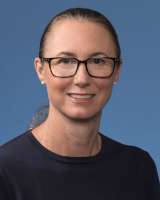
Adjunct Professor
Department of Pediatrics
Division of Pediatric Infectious Diseases
UCLA Mattel Children’s Hospital
David Geffen School of Medicine at UCLA
Dr. Tobin earned her undergraduate degree from the University of California, San Diego, and her medical degree from the University of Southern California School of Medicine. She completed her residency in the Boston Combined Residency Program in pediatrics and pursued fellowship training at the University of Washington/Seattle Children’s Hospital. As a board-certified specialist in pediatric infectious diseases, Dr. Tobin has dedicated her career to advancing the understanding and treatment of pediatric infectious diseases and of HIV.
Dr. Tobin’s research primarily focuses on HIV. During her fellowship, she investigated viral evolution. Dr. Tobin was the first to demonstrate that low-level viremias in patients may represent two distinct processes: the reactivation of archived virus from peripheral blood mononuclear cells (PBMCs) or active viral replication and selection of drug-resistant viruses. These findings provided valuable insights into the HIV viral reservoir, a key challenge in the quest for an HIV cure. Dr. Tobin's passion for HIV research has expanded to encompass various aspects, including HIV subpopulations, viral characteristics, comorbidities, and the role of the microbiome and metabolome in HIV. Recently, her work has focused on children who are HIV-exposed but uninfected (CHEU). Historically, CHEU have faced 2-3 times the mortality rates of their unexposed peers. While maternal antiretroviral therapy improved outcomes, it did not fully normalize them; CHEU continue to experience increased morbidity and a 0.5-fold rise in mortality. Collaborating with others, Dr. Tobin identified perturbations in the microbiome of CHEU, suggesting that these microbial alterations may contribute to their heightened risk of severe infections.
Dr. Tobin has authored and co-authored multiple research publications in journals including the New England Journal of Medicine, Microbiome, and Cell. She has also authored multiple reviews and book chapters. Dr. Tobin currently serves as the scientific director for the International Maternal Pediatric Adolescent AIDS Clinical Trials Network (IMPAACT) Laboratory Center and has been a key member of IMPAACT protocol teams. Additionally, Dr. Tobin is an active member of the Department of Health and Human Services Panel on Antiretroviral Therapy and Medical Management of Children Living with HIV.
Hung Ton-That, PhD - Oral & Systemic Health Sciences

Professor of Oral & Systemic Health Sciences
Director, Dentist-Scientist and Oral Health-Researcher Training Program
UCLA School of Dentistry
Dr. Ton-That’s laboratory focuses on the molecular assembly on the cell surface of Gram-positive pathogens, oxidative protein folding in these monoderms, and virulence mechanisms of the Gram-negative pathobiont Fusobacterium nucleatum.
Dr. Ton-That obtained a BS in chemistry and a PhD in microbiology from the University of California at Los Angeles in 1996 and 2000, respectively. As a postdoctoral fellow, Dr. Ton-That trained with Dr. Olaf Schneewind at the University of Chicago to investigate the mechanism of pilus assembly in Gram-positive bacteria. Between 2004 and 2018, he held faculty positions at the University of Connecticut Health Center and the University of Texas McGovern Medical School, continuing his studies of Gram-positive pili and their role in biofilm formation and bacterial pathogenesis. In July 2018, he joined the faculty of the Division of Oral Biology and Medicine at the UCLA School of Dentistry. Dr. Ton-That is a Fellow of the American Academy of Microbiology. Ton-That Lab
Thomas A. Vallim, PhD - Cardiology; Biological Chemistry
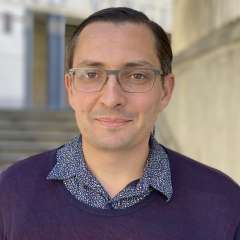
Associate Professor
Department of Medicine, Division of Cardiology and Department of Biological Chemistry
Director, Molecular Biology Interdepartmental Doctoral Program (MBIDP) GREAT Home Area
David Geffen School of Medicine at UCLA
Dr. Vallim is an associate professor in the Departments of Medicine, Cardiology and Biological Chemistry at UCLA. He is also the director of the Gene Regulation, Epigenomics, and Transcriptomics within the Molecular Biology Interdepartmental Doctoral Program (MBIDP). He received his undergraduate degree in biochemistry and biological chemistry from the University of Nottingham in England, and his PhD in nutritional biochemistry also at the University of Nottingham. He then moved to complete his postdoc at UCLA on lipid metabolism and nuclear receptors. Dr. Vallim started his lab at UCLA in 2013, and his lab studies in how changes in lipid metabolism impact cardiometabolic disease, with a particular focus in the role of specialized lipids, such as bile acids, in the gut-liver axis affect normal liver physiology and disease. The Tarling-Vallim Lab
Elizabeth "Beth" Videlock, MD, PhD - Digestive Diseases
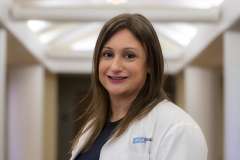
Health Sciences Assistant Clinical Professor of Medicine
Center for Inflammatory Bowel Diseases
Vatche and Tamar Manoukian Division of Digestive Diseases
David Geffen School of Medicine at UCLA
Dr. Videlock grew up in Philadelphia and earned a BS in chemistry from Yale University. She studied medicine at the David Geffen School of Medicine at UCLA. Dr. Videlock began her research career in the field of the gut-brain axis during medical school under the mentorship of Dr. Lin Chang in the UCLA G. Oppenheimer Center for Neurobiology of Stress and Resilience.
She then trained in internal medicine at the Beth Israel Deaconess Medical Center in Boston. Dr. Videlock returned to UCLA for her gastroenterology fellowship as a Specialty Training and Advanced Research (STAR) fellow. Through the STAR program, Dr. Videlock completed a PhD in the laboratory of Charalabos "Harry" Pothoulakis with co-mentorship from Dr. Chang. Her doctoral research used translational and cell culture approaches to study peripheral molecular changes in IBS.
Dr. Videlock joined the UCLA Vatche and Tamar Manoukian Division of Digestive Diseases faculty in 2019. Her laboratory is within the UCLA Center for Inflammatory Bowel Diseases. Videlock Lab
Elizabeth Volkmann, MD, MS - Rheumatology

Associate Professor
Director, UCLA Scleroderma Program
Founder and Co-Director, UCLA Connective Tissue Disease-Related Interstitial Lung Disease (CTD-ILD) Program
Division of Rheumatology
Department of Medicine
University of California, Los Angeles
As a clinical-translational investigator, Dr. Volkmann research studies in systemic sclerosis aim to: 1) predict clinical phenotypes; 2) identify prognostic biomarkers to inform risk stratification; 3) define biological targets for therapeutic intervention; and 4) characterize novel treatment response biomarkers. She conducted the first study to characterize the gut microbiome in patients with systemic sclerosis, and she now leads an international microbiome consortium study in systemic sclerosis comprised of investigators from four continents and more than 12 countries. Dr. Volkmann has an enduring interest in understanding the effects of diet on microbial community structure and function in patients with systemic sclerosis. She is the recipient of numerous awards in rheumatology, including the Edith Busch Prize in Rheumatology (2020) and the Doctor of the Year Award from the National Scleroderma Foundation (2022). As a member of the UCLA community for over 20 years, she enjoys mentoring aspiring physician scientists and collaborating with specialists across disciplines, including radiology, pulmonary medicine, nuclear medicine, and gastroenterology. Dr. Volkmann Provider Profile
Karol Watson, MD, PhD - Cardiology

Co-Director, UCLA Program in Preventive Cardiology
Director, UCLA Barbra Streisand Women's Heart Health Program
Professor of Medicine
Division of Cardiology
David Geffen School of Medicine at UCLA
John Mazziotta, MD, PhD, Term Chair in Medicine
Dr. Watson is a principal investigator for several large National Institutes of Health research studies including the Diabetes Prevention Program Outcomes Study and the Multi-ethnic Study of Atherosclerosis. She is a fellow of the American College of Cardiology and a member of the American Heart Association. She is also a board member of the American Heart Association, Western States Affiliate, and of the American Society of Preventive Cardiology. Dr. Watson is the chairperson of the Scientific Advisory Board for WomenHeart, the largest national organization for women survivors of heart disease.
Paul S. Weiss, PhD - Chemistry & Biochemistry; Bioengineering; Materials Science & Engineering
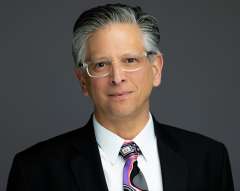
UC Presidential Chair
Distinguished Professor of Chemistry & Biochemistry, Bioengineering
Distinguished Professor of Materials Science & Engineering
California NanoSystems Institute
University of California, Los Angeles
Dr. Weiss received his SB and SM degrees in chemistry from MIT in 1980 and his PhD in chemistry from the University of California at Berkeley in 1986. He was a postdoctoral member of technical staff at Bell Laboratories from 1986-88 and a visiting scientist at IBM Almaden Research Center from 1988-89. He served as the director of the California NanoSystems Institute and held the Fred Kavli Chair in NanoSystems Sciences at UCLA from 2009-14. Before coming to UCLA, he was a distinguished professor of chemistry and physics at the Pennsylvania State University, where he began his academic career in 1989. His interdisciplinary research group includes chemists, physicists, biologists, materials scientists, mathematicians, bioengineers, electrical and mechanical engineers, computer scientists, clinicians, and physician scientists. They focus on the ultimate limits of miniaturization, exploring the atomic-scale chemical, physical, optical, mechanical, electronic, and spin properties of surfaces, interfaces, supramolecular, and biomolecular assemblies. They develop new techniques to expand the applicability and chemical specificity of scanning probe microscopies. They apply these and other tools to study self- and directed assembly, and molecular and nanoscale devices. They advance nanofabrication down to ever smaller scales and greater chemical specificity to operate and to test functional molecular assemblies, and to connect to the chemical and biological worlds in neuroscience, gene editing, cancer immunotherapy, tissue engineering, cellular agriculture, and the microbiome. He has authored over 500 publications, holds over 40 patents, and has given over 900 invited, plenary, keynote, and named lectures. He is involved in startups from his and other labs in biotechnology, food security, energy, entertainment, and healthcare.
Dr. Weiss has been awarded a National Science Foundation (NSF) Presidential Young Investigator Award (1991-96), the Scanning Microscopy International Presidential Scholarship (1994), the B. F. Goodrich Collegiate Inventors Award (1994), an Alfred P. Sloan Foundation Fellowship (1995-97), the American Chemical Society (ACS) Nobel Laureate Signature Award for Graduate Education in Chemistry (1996), a John Simon Guggenheim Memorial Foundation Fellowship (1997), a NSF Creativity Award (1997-99), the ACS Award in Colloid and Surface Chemistry (2015), the ACS Southern California Section Tolman Medal (2017), the ACS Patterson-Crane Award in Chemical Information (2018), and the IEEE Nanotechnology Pioneer Award (2019), among others. He was elected a fellow of the: American Association for the Advancement of Science (2000), American Physical Society (2002), American Vacuum Society (2007), ACS (2010), American Academy of Arts and Sciences (2014), American Institute for Medical and Biological Engineering (2016), Canadian Academy of Engineering (2017), Materials Research Society (2019), IEEE (2021), and an honorary fellow of the Chinese Chemical Society (2010) and Chemical Research Society of India (2020-21). He received Penn State’s University Teaching Award from the Schreyer Honors College (2004), was named a nanofabrication fellow at Penn State (2005), and won the Alpha Chi Sigma Outstanding Professor Award (2007). He was a visiting professor at the University of Washington, Department of Molecular Biotechnology (1996-97) and Kyoto University, Electronic Science & Engineering Department and Venture Business Laboratory (1998 and 2000), and a distinguished visiting professor at the Kavli Nanoscience Institute and the Joint Center for Artificial Photosynthesis at Caltech (2015). He is a visiting scholar at the Kavli Institute for Bionano Science & Technology and the Wyss Institute for Biologically Inspired Engineering at Harvard University (2015-). He held the Institut National de la Recherche Scientifique (INRS) Chaire d'excellence Jacques Beaulieu (2016-17) and was a Fulbright Specialist for the Czech Republic (2017). Weiss was a member of the U.S. National Committee to the International Union of Pure and Applied Chemistry (2000-05). He has been the technical co-chair of the Foundations of Nanoscience Meetings and thematic chair of the Spring 2009 and Fall 2018 ACS National Meetings. He was the senior editor of IEEE Electron Device Letters for molecular and organic electronics (2005-07), and was the founding editor-in-chief of ACS Nano (2007-2021). At ACS Nano, he won the Association of American Publishers, Professional Scholarly Publishing PROSE Award for 2008, Best New Journal in Science, Technology, and Medicine, and ISI’s Rising Star Award a record ten times. Paul Weiss Lab
Shimon Weiss, DSc, PhD - Chemistry & Biochemistry; Physiology

Distinguished Research Professor
The Dean Willard Chair in Chemistry and Biochemistry
Department of Chemistry and Biochemistry
Department of Physiology
California NanoSystems Institute
University of California, Los Angeles
Dr. Shimon received his PhD in electrical engineering from the Technion, Israel in 1989. After a year of postdoctoral research in AT&T Bell Laboratories, he was hired by Lawrence Berkeley National Laboratory as a staff Scientist. In 2001, he joined the departments of chemistry & biochemistry and physiology at UCLA. His research interests include 1) Identifying and cataloging all gene sequences and their corresponding protein high-resolution static 3-dimensional structures is only a prelude to the real challenges of future biological inquiries, 2) conformational dynamics of biomolecules, 3) development of semiconductor nanocrystals as biological probes, and 4) biomolecular interactions by coincidence detection. Dr. Weiss Profile
Gerard C. L. Wong, PhD - Bioengineering; Chemistry & Biochemistry; Microbiology, Immunology & Molecular Genetics

Professor
Department of Bioengineering
Department of Chemistry & Biochemistry
Department of Microbiology, Immunology & Molecular Genetics
California NanoSystems Institute at UCLA
Dr. Wong received his BS and PhD in physics at Caltech and Berkeley. He joined the Materials Science Department and Physics Department at the University of Illinois at Urbana-Champaign in 2000 and was recruited to UCLA in 2009. His research recognition includes a Beckman Young Investigator Award and an Alfred P Sloan Fellowship. He is a Fellow of the American Physical Society, a Fellow of the American Academy of Microbiology, and a Fellow of the American Institute for Medical and Biological Engineering. Wong Lab
Lili Yang, PhD - Microbiology, Immunology & Molecular Genetics; Bioengineering

Professor
Department of Microbiology, Immunology & Molecular Genetics
Department of Bioengineering
Eli & Edythe Broad Center of Regenerative Medicine and Stem Cell Research
Jonsson Comprehensive Cancer Center
Parker Institute for Cancer Immunotherapy
Dr. Yang received her PhD degree in biology from the California Institute of Technology (Caltech), studying with Dr. David Baltimore. She is currently professor of microbiology, immunology and molecular genetics at the University of California, Los Angeles (UCLA). Her research laboratory at UCLA studies tumor immunology and cancer immunotherapy, with a special focus on developing gene and cell-based immunotherapy for cancer. So far her work has resulted in over 70 publications, 28 patents, 2 clinical trials, and 2 biotech startups.
In recognition of her scientific achievements, Dr. Yang has received multiple prestigious awards, including a TR35 (Innovators Under 35) Award from the MIT Technology Review Magazine, a Director’s New Innovator Award from the National Institute of Health (NIH), a Young Investigator Award from the American Association of Immunologists (AAI), and an Outstanding New Investigator Award from the American Society of Gene & Cell Therapy (ASGCT).
Dr. Yang is also widely recognized for her biotech accomplishments. She has been named Women in Biopharma by Endpoints News in 2022, and Top Women in Academic Entrepreneurship by BIOS in 2023. Yang Engineering Immunity Lab
Xia Yang, PhD - Integrative Biology & Physiology; Molecular & Medical Pharmacology
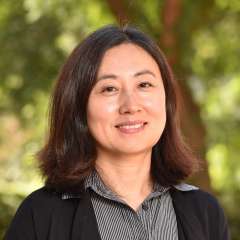
Professor, Department of Integrative Biology and Physiology
Professor, Department of Molecular & Medical Pharmacology
Vice Chair, Molecular, Cellular, and Integrative Physiology (MCIP) PhD Interdepartmental Program
Vice Chair, Computational and Systems Biology (CaSB) Undergraduate Interdepartmental Program
University of California, Los Angeles
Dr. Yang's lab specializes in developing computational tools to integrate multiomics data (genetic, transcriptome, epigenome, proteome, metabolome, and microbiome) and model multitissue multiomics networks underlying complex diseases. She received her PhD in molecular genetics and bioinformatics from Georgia State University and then did postdoctoral training in systems genetics at UCLA. She was subsequently senior research scientist at Rosetta Inpharmatics/Merck & Co and then principal scientist and director of Systems Biology at Sage Bionetworks, before returning to UCLA as a faculty. Her experiences in both industry and academia enable a broad research portfolio from computational tool development and disease mechanism investigations to drug discovery and environmental exposure studies using multiomics approaches. Yang Lab